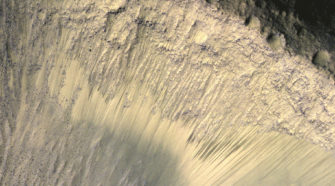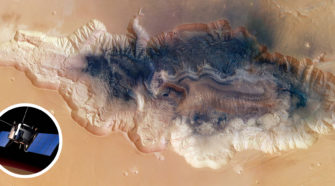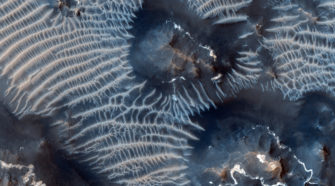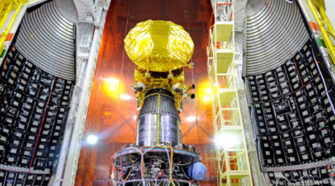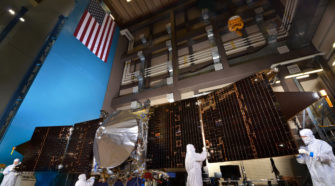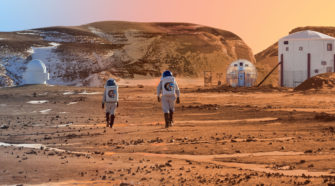Mars
NASA Mars spacecraft reveals a more dynamic Red Planet
NASA’s Mars Reconnaissance Orbiter has revealed to scientists slender dark markings — possibly due to salty water – that advance seasonally down slopes surprisingly close to the Martian equator. “The equatorial surface region of Mars has been regarded as dry, free of liquid or frozen water, but we may need to rethink that,” said Alfred …
Robotic armada is invading Mars from all directions
The Red Planet is getting a whole lot of attention from Earthlings right now, and it’s like never before in the history of humanity and space exploration. Currently, an armada of five spacecraft from Earth are actively exploring the vicinity of Mars, including a trio of orbiters and a duo of rovers. All but one …
Generations of windblown sediments on Mars
This colorful scene is situated in the Noctis Labyrinthus region of Mars, perched high on the Tharsis rise in the upper reaches of the Valles Marineris canyon system. Targeting the bright rimmed bedrock knobs, the image also captures the interaction of two distinct types of windblown sediments. Surrounding the bedrock knobs is a network of …
India launching MOM to study Mars
India is gearing up for its first ever space undertaking to the Red Planet – the Mars Orbiter Mission, or MOM – which is the brainchild of the Indian Space Research Organization, or ISRO. Among other objectives, MOM will conduct a search for potential signatures of Martian methane – which could stem from either living …
NASA’s MAVEN orbiter set to launch on quest to study Mars atmosphere
MAVEN (Mars Atmosphere and Volatile EvolutioN Mission) is NASA’s next mission to Mars. After a decade of hard work by dedicated science and engineering teams, it is scheduled to lift off on Nov. 18, 2013 from Cape Canaveral, Florida on an Atlas V 401 rocket. The 903 kilogram (2000 pound) probe will arrive at the …
The Mars Society: Humans to Mars in a decade
A long time ago in the Milky Way Galaxy, Chris McKay, Penelope Boston, and Carol Stoker were on Planet Earth contemplating all things Mars. These three scientists, graduate students at the University of Colorado, decided to form a group called the Mars Underground and hold annual meetings to explore the science behind putting humans on …

